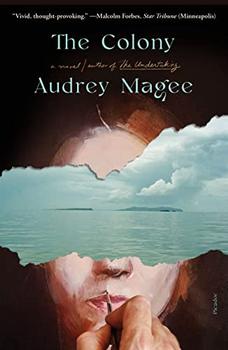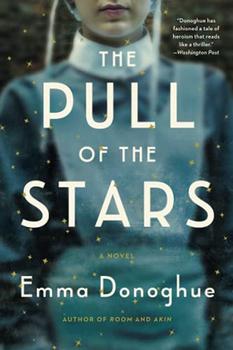Summary | Excerpt | Reviews | Beyond the book | Read-Alikes | Genres & Themes | Author Bio

It is 1859 and Lib Wright, a nurse trained under Florence Nightingale on the battlefields of the Crimean War, travels from London to rural Ireland on a very peculiar assignment: 11-year-old Anna O'Donnell has reportedly refused food for four months, claiming to survive on God's grace alone, and a committee of town officials seeks independent confirmation that a miracle has transpired. Lib, level-headed and agnostic, is certain she will make quick work of uncovering a ruse. Instead, she finds herself in a crisis where her professional ethics are tested and the stakes are life or death.
Shortly after Anna's older brother passes away, a casualty of Ireland's dire potato famine, she takes her last bite of food: the Eucharist at Communion on her 11th birthday. Anna insists she requires no further sustenance, and is deemed a "Wonder," her home becoming a pilgrimage site for religious believers from neighboring towns. Her backward doctor, ignorant parents, and the town minister seem certain of divine intervention, but they decide to bring in Lib and another nurse, the Catholic nun, Sister Michael, to watch the girl around the clock for two weeks to verify Anna's claims — that she truly is not eating.
As the days pass, Lib sifts through the scant available evidence and begins to piece together a troubling narrative. Anna repeats the same prayer compulsively throughout the day, she speaks almost exclusively in scripture, and all her worldly possessions are religious icons. Lib becomes so fixated on detecting duplicity that she fails to register the obvious: Anna is indeed starving herself and her physical condition is rapidly deteriorating.
With Anna's parents' heads seemingly in the proverbial sand, believing in the "miracle," and her doctor suggesting the child is an evolutionary marvel, advanced beyond human needs, Lib turns to the only other clear-thinking individual, a journalist sent from The Irish Times to report on the unusual story. They find themselves flung together on a mission to save the girl from her own beliefs.
While Lib has many admirable (even heroic) qualities, she is also arrogant and extremely derisive of the village's inhabitants, mocking their dilapidated homes and meager food and sneering at their beliefs. This is blatant xenophobia — she assumes all Irish are "shiftless" simpletons. Upon arrival, she is sure Anna O'Donnell is a "swindler," her miraculous powers, a "grotesque charade." As it becomes apparent that the girl and everyone around her seem to genuinely believe that she need not eat, Lib wonders, "Was it Anna who was suffering from religious mania or her whole nation?"
Donoghue makes the uncommon narrative choice to confirm all of Lib's prejudices. Everyone she encounters in the village is exactly as stupid as she thinks they are. Though Lib's pride is humbled by her inability to help Anna, she learns no lessons about opening her mind because she is proven right — the entire provincial Irish town is profoundly ignorant and too stubborn to listen to reason. As she grows fond of her charge, Lib sees the girl as a damsel in distress, enchained by the dogma of those around her. The author is more subtle and effective in gently teasing out Lib's back story and its influence on her psyche, and the slow blossoming of her relationship with the Irish journalist.
Donoghue vividly and poetically illustrates the hollowed out and waterlogged countryside of the Irish Midlands, its areas of ruin, a burned down "roofless cabin...its gabled walls accusing the sky," endless bogs so deep one could be sucked in, the cemetery filled with "tilting, greenish headstones." These descriptions, along with her spirited, headstrong heroine are reminiscent of Jane Eyre.
The Wonder is a psychological enigma fraught with mortal tension, that the reader solves alongside Lib. Donoghue raises compelling philosophical questions about free will, the extent to which a just society can tolerate religious zealotry, and the moral/ethical obligations of medical practitioners. When our neighbors become infected with a "collective madness," how can we shake them awake?
![]() This review was originally published in The BookBrowse Review in October 2016, and has been updated for the
September 2017 edition.
Click here to go to this issue.
This review was originally published in The BookBrowse Review in October 2016, and has been updated for the
September 2017 edition.
Click here to go to this issue.

If you liked The Wonder, try these:

by Audrey Magee
Published 2023
In 1979, as violence erupts all over Ireland, two outsiders travel to a small island off the west coast in search of their own answers, despite what it may cost the islanders.

by Emma Donoghue
Published 2021
In Dublin, 1918, a maternity ward at the height of the Great Flu is a small world of work, risk, death, and unlooked-for love, in "Donoghue's best novel since Room" (Kirkus Reviews).
Your guide toexceptional books
BookBrowse seeks out and recommends the best in contemporary fiction and nonfiction—books that not only engage and entertain but also deepen our understanding of ourselves and the world around us.